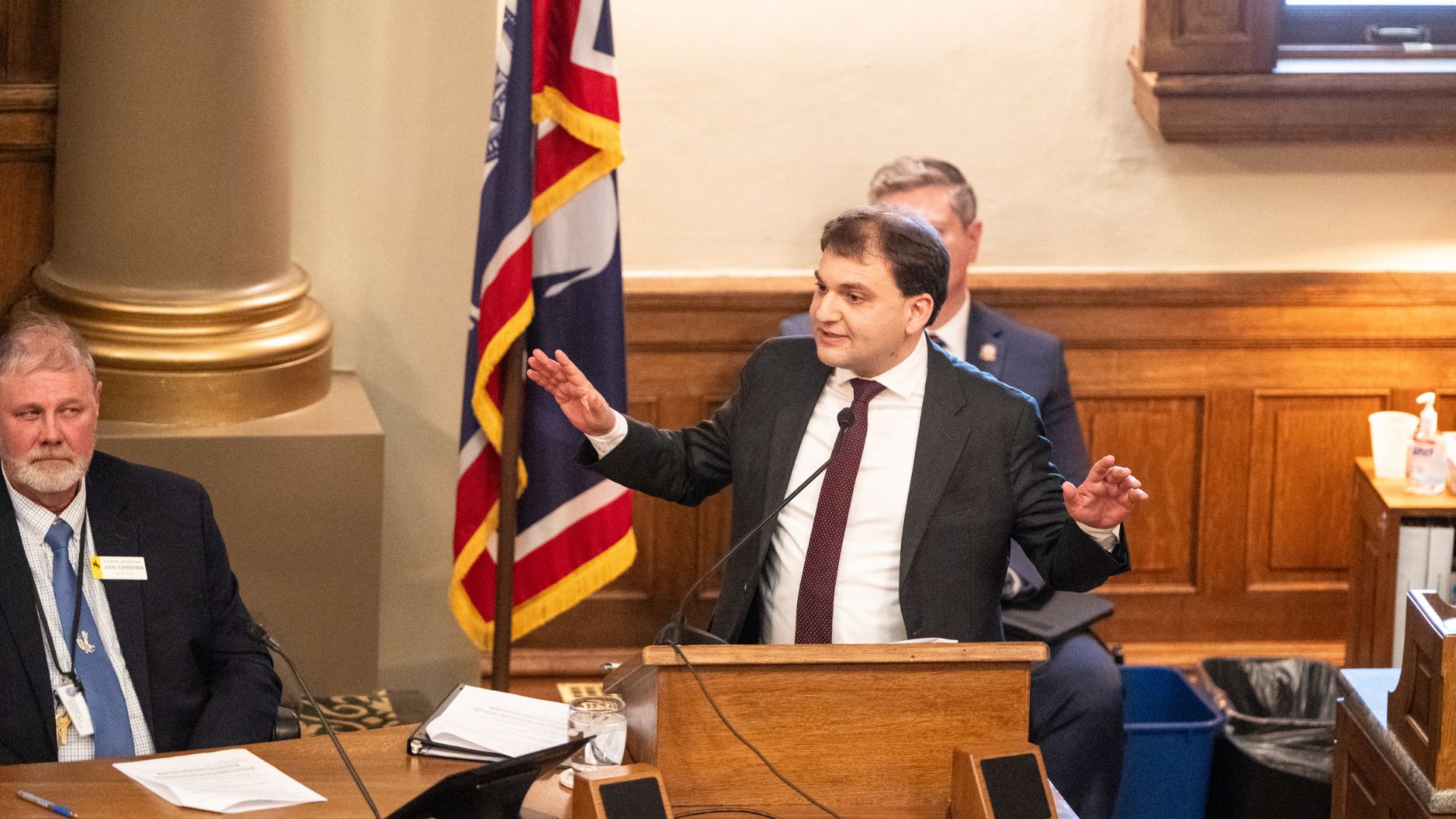Gray, Freedom Caucus defend claims about voter requirements

Secretary of State Chuck Gray, photo by Michael Smith
JACKSON — Backers of a new state law requiring proof of citizenship to register to vote touted Wyoming as the “first in the nation” to do so, but that’s not entirely true, as the history is more nuanced.
Citing claims from Wyoming Secretary of State Chuck Gray and the far-right Wyoming Freedom Caucus, several media outlets, including the News&Guide, reported recently that Wyoming set a new precedent with the additional voting requirements. Gray and caucus lawmakers pushed for the election measure and celebrated when Gov. Mark Gordon allowed House Bill 156 to become law without his signature.
“HB 156 makes Wyoming the first in the nation to apply proof of citizenship for registering to vote for all elections,” Gray said in a statement March 21. The Freedom Caucus echoed that claim in an all-caps post on its Facebook page.
But the National Conference of State Legislatures reported that multiple states already require documentary proof of citizenship, including New Hampshire and Louisiana in 2024. Wyoming was cited as the first to do so this year, but not first overall.
Two of the first reported proof of citizenship voting laws were in Arizona in 2005 and Kansas in 2011.
When asked to clarify his claim in light of these facts, Gray said a reporter’s questions showed “a lack of understanding.”
“The dishonest accusations of the elitist limousine liberals at the Jackson Hole News&Guide to question my honesty actually shows the opposite and once again shows how dishonest the Jackson Hole News&Guide is,” Gray said in a statement.
Congress passed a nationwide law in 1996 barring noncitizens from voting in federal elections. The Wyoming Constitution allows only U.S. citizens who reside in the state to vote in all elections.
The Brennan Center for Justice studied the impacts of the Kansas law two years after implementation, when “tens of thousands of attempted registrants” were blocked from voting in Kansas, affecting 8% to14% of new registrants. Almost all were eligible citizens. Federal courts declared the law an unconstitutional burden on voting rights, and it hasn’t been enforced since 2018, according to the Associated Press.
Gray took issue with technicalities in the Arizona and Kansas laws, emphasizing that he stated Wyoming was “first state in the nation to apply proof of citizenship for all elections.”
Wyoming’s law is stricter than New Hampshire’s, Gray said, because it lists the nine documents that would qualify as proof, such as a passport, tribal ID or Wyoming driver’s license that doesn’t mark the holder as a noncitizen.
New Hampshire allows “other reasonable documentation,” he said, which is not specific enough.
The New Hampshire law “is really not a requirement at all, because it can be dispensed with at the discretion of one individual,” Gray said.
The Equality State Policy Center, which adamantly opposed Wyoming’s bill during the recent legislative session, said Monday, “Of course, people will ask questions,” in response to Gray’s touting of being first.
“Less comprehensive proof of citizenship and proof of residency laws in other states, like Kansas, have already been struck down for disenfranchising eligible voters,” said Marissa Carpio, the group’s policy director. “These court cases cost the state millions of taxpayer dollars, so it’s reasonable for the public and press to seek clarity. Chuck Gray’s response is disappointing, not just because of the repeated name-calling and dismissal of dissent, but because it ignores the real issue: how HB 156 impacts Wyoming voters.”
Carpio said Wyoming doesn’t actually have a noncitizen voter problem.
“We all agree and already have it enshrined in our constitution that only U.S. citizens who are Wyoming residents can vote,” she said. “This law is a solution in search of a problem, elevated by a search for national attention, but its real impact will fall on eligible Wyoming voters, particularly women, the elderly and other vulnerable populations, who will now face unnecessary barriers at the ballot box.”
The Freedom Caucus made arguments similar to Gray’s in defense of its claim. Rep. Rachel Rodriguez-Williams, R-Cody, chair of the caucus, said Wyoming was the first state to “actually take action to require proof of citizenship to vote, without gaping exceptions in their laws.”
Louisiana doesn’t specify any documentary proof of citizenship at all, she said, but the secretary of state is directed in its statutes to create a form that is used to register to vote, and applicants must sign an affidavit swearing they are a U.S. citizen, punishable under Louisiana law if false.
“It’s laughable that the same left-wing media who was screaming that the sky is falling when Wyoming took action to prevent illegal aliens from voting is now claiming Wyoming is somehow late to the party,” Rodriguez-Williams said in a statement.
This story was published on April 2, 2025.








